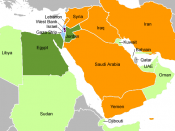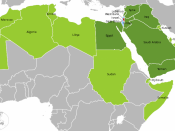Superpower conflict on the Middle East was remarkably different from other global Cold War issues. Although the Cold War is traditionally seen as an ideological conflict, the role of ideology in the Middle East was usurped by other factors (notably economic and nationalistic), thus superpower intervention was motivated more by "anti-Soviet" and "anti-West" (as opposed to "anti-Communist" and "anti-Capitalist") sentiment. In general, the roles of the US and the U.S.S.R in the Middle East can be summarized under two broad categories: military and minatory support. In assessing these roles, it can be considered how each superpower contributed to the Arab-Israeli conflict.
Military support was one of the most inflammatory roles of the two superpowers in the Arab-Israeli conflict. Throughout the conflict, there was a tendency for the superpowers to court alliances through offers to weaponry, both as a means of providing security for clients and of manipulating the regionally balance of power.
It is not unreasonable to say that without the superpowers' policies of the transferring military resources to their Middle Eastern allies, the entire Arab-Israeli conflict may never have reached the scale it did over the course of 1948-79.
However, the success of such military support is questionable. The resources transferred, firstly, were not always appropriate to the military needs and capabilities of the recipients. Jon Glassman observes that there was a tendency (mainly with the U.S.S.R) to provide too many arms and too little accompanying training, to "give the and the illusion rather than the reality of overwhelming strategic superiority" and emphasize the military balance on paper rather than in actuality. The effect of this, Glassman concludes, was that the "illusion" gave the Arab confrontational states the confidence to go to war (for example, the Egyptians in 1967), while the reality ensured they would lose.
Secondly, the policy...


